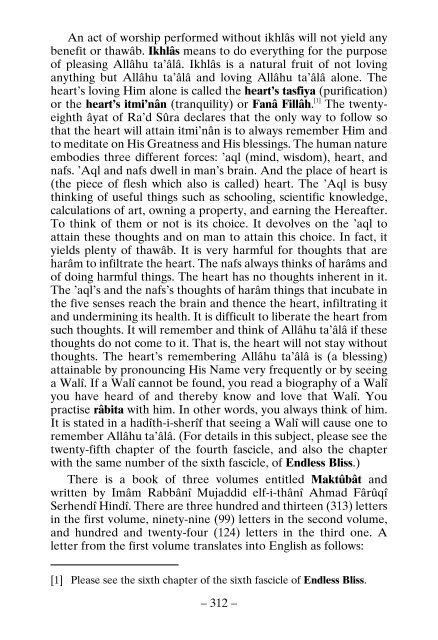O Son !
THE BOOK ‘O SON’ Al-hamdu lillâhi Rabbil ’âlamîn. Wa-s-salâtu wa-s-salâmu ’alâ Rasûlinâ Muhammadin wa Âlihi wa Sahbihi ajma’în. 1– O son! Collecting from books written by the scholars of the Hanafî Madhhab three hundred and sixty hadîth-i-sherîfs and forty-four khabars and also the seven essentials and the five rukns and the seven wâjibs and the fourteen sunnats and the twenty-five mustahabs and the fourteen mufsids of namâz, I have explained them for you. Adapt your acts and deeds to these teachings so that you attain fayz and nejât (salvation)! 2– Also for your information, I have collected a thousand and ninety âdâb (adabs) for you and for other young Muslims like you. If you adapt your actions and acts of worship to these teachings, they will be sufficient for you. If you laze, disobey Allâhu ta’âlâ and cease from these practices and manners, you will be afflicted with slavery and disgrace in the world and subjected to torment in the world to come. If you live up to them and advise your Muslim brothers to do the same, it will be useful for you. They will say blessings over you. And Haqq ta’âlâ will accept their invocations. For, a slave will be pardoned on account of another slave’s invocations for them.
THE BOOK ‘O SON’
Al-hamdu lillâhi Rabbil ’âlamîn. Wa-s-salâtu wa-s-salâmu ’alâ
Rasûlinâ Muhammadin wa Âlihi wa Sahbihi ajma’în.
1– O son! Collecting from books written by the scholars of the
Hanafî Madhhab three hundred and sixty hadîth-i-sherîfs and
forty-four khabars and also the seven essentials and the five rukns
and the seven wâjibs and the fourteen sunnats and the twenty-five
mustahabs and the fourteen mufsids of namâz, I have explained
them for you. Adapt your acts and deeds to these teachings so that
you attain fayz and nejât (salvation)!
2– Also for your information, I have collected a thousand and
ninety âdâb (adabs) for you and for other young Muslims like you.
If you adapt your actions and acts of worship to these teachings,
they will be sufficient for you. If you laze, disobey Allâhu ta’âlâ
and cease from these practices and manners, you will be afflicted
with slavery and disgrace in the world and subjected to torment in
the world to come.
If you live up to them and advise your Muslim brothers to do
the same, it will be useful for you. They will say blessings over you.
And Haqq ta’âlâ will accept their invocations. For, a slave will be
pardoned on account of another slave’s invocations for them.
Create successful ePaper yourself
Turn your PDF publications into a flip-book with our unique Google optimized e-Paper software.
An act of worship performed without ikhlâs will not yield any<br />
benefit or thawâb. Ikhlâs means to do everything for the purpose<br />
of pleasing Allâhu ta’âlâ. Ikhlâs is a natural fruit of not loving<br />
anything but Allâhu ta’âlâ and loving Allâhu ta’âlâ alone. The<br />
heart’s loving Him alone is called the heart’s tasfiya (purification)<br />
or the heart’s itmi’nân (tranquility) or Fanâ Fillâh. [1] The twentyeighth<br />
âyat of Ra’d Sûra declares that the only way to follow so<br />
that the heart will attain itmi’nân is to always remember Him and<br />
to meditate on His Greatness and His blessings. The human nature<br />
embodies three different forces: ’aql (mind, wisdom), heart, and<br />
nafs. ’Aql and nafs dwell in man’s brain. And the place of heart is<br />
(the piece of flesh which also is called) heart. The ’Aql is busy<br />
thinking of useful things such as schooling, scientific knowledge,<br />
calculations of art, owning a property, and earning the Hereafter.<br />
To think of them or not is its choice. It devolves on the ’aql to<br />
attain these thoughts and on man to attain this choice. In fact, it<br />
yields plenty of thawâb. It is very harmful for thoughts that are<br />
harâm to infiltrate the heart. The nafs always thinks of harâms and<br />
of doing harmful things. The heart has no thoughts inherent in it.<br />
The ’aql’s and the nafs’s thoughts of harâm things that incubate in<br />
the five senses reach the brain and thence the heart, infiltrating it<br />
and undermining its health. It is difficult to liberate the heart from<br />
such thoughts. It will remember and think of Allâhu ta’âlâ if these<br />
thoughts do not come to it. That is, the heart will not stay without<br />
thoughts. The heart’s remembering Allâhu ta’âlâ is (a blessing)<br />
attainable by pronouncing His Name very frequently or by seeing<br />
a Walî. If a Walî cannot be found, you read a biography of a Walî<br />
you have heard of and thereby know and love that Walî. You<br />
practise râbita with him. In other words, you always think of him.<br />
It is stated in a hadîth-i-sherîf that seeing a Walî will cause one to<br />
remember Allâhu ta’âlâ. (For details in this subject, please see the<br />
twenty-fifth chapter of the fourth fascicle, and also the chapter<br />
with the same number of the sixth fascicle, of Endless Bliss.)<br />
There is a book of three volumes entitled Maktûbât and<br />
written by Imâm Rabbânî Mujaddid elf-i-thânî Ahmad Fârûqî<br />
Serhendî Hindî. There are three hundred and thirteen (313) letters<br />
in the first volume, ninety-nine (99) letters in the second volume,<br />
and hundred and twenty-four (124) letters in the third one. A<br />
letter from the first volume translates into English as follows:<br />
[1] Please see the sixth chapter of the sixth fascicle of Endless Bliss.<br />
– 312 –

















